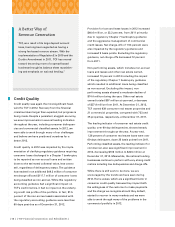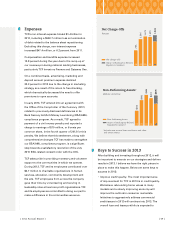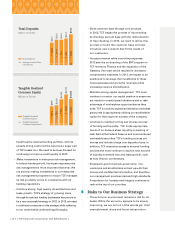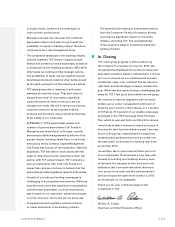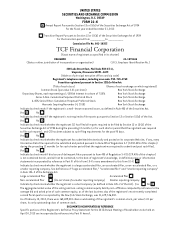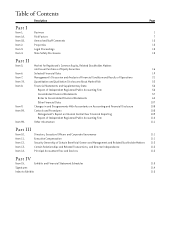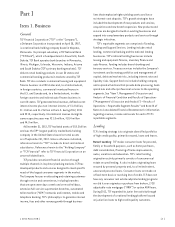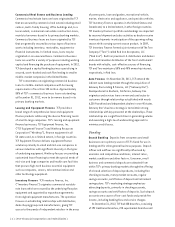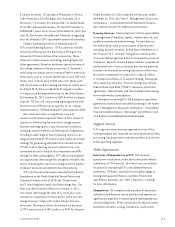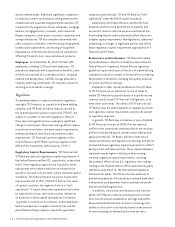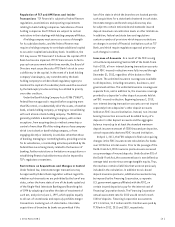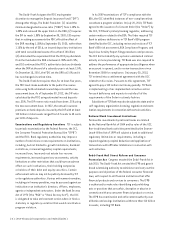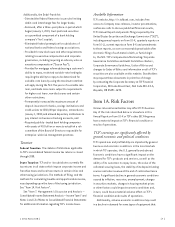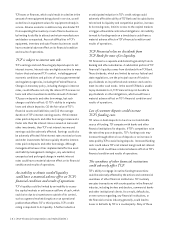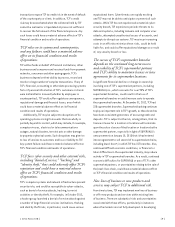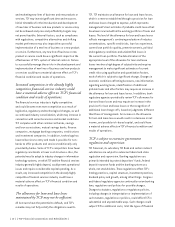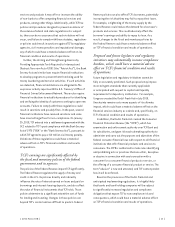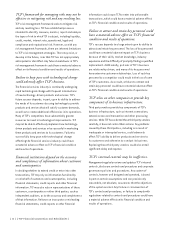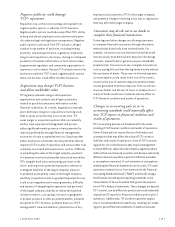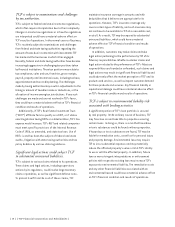TCF Bank 2012 Annual Report Download - page 20
Download and view the complete annual report
Please find page 20 of the 2012 TCF Bank annual report below. You can navigate through the pages in the report by either clicking on the pages listed below, or by using the keyword search tool below to find specific information within the annual report.and investment banks. Additional significant competition
for deposits comes from institutions selling money market
mutual funds and corporate and government securities. TCF
competes for the origination of loans with banks, mortgage
bankers, mortgage brokers, consumer, and commercial
finance companies, credit unions, insurance companies and
savings institutions. TCF also competes nationwide with
other companies and banks in the financing of equipment,
inventory and automobiles, and leasing of equipment.
Expanded use of the Internet has increased competition
affecting TCF and its loan, lease and deposit products.
Employees As of December 31, 2012, TCF had 7,328
employees, including 2,175 part-time employees. TCF
provides its employees with comprehensive benefits, some
of which are provided on a contributory basis, including
medical and dental plans, a 401(k) savings plan with a
company matching contribution, life insurance and short-
and long-term disability coverage.
Regulation
The banking industry is subject to extensive regulatory
oversight. TCF Financial, as a publicly held bank holding
company, and TCF Bank, which has deposits insured by
the Federal Deposit Insurance Corporation (“FDIC”), are
subject to a number of laws and regulations. Many of
these laws and regulations have undergone significant
change in recent years. These laws and regulations impose
restrictions on activities, minimum capital requirements,
lending and deposit restrictions and numerous other
requirements. TCF Financial’s primary regulator is the
Federal Reserve and TCF Bank’s primary regulator is the
Office of the Comptroller of the Currency (“OCC”).
Regulatory Capital Requirements TCF Financial and
TCF Bank are subject to regulatory capital requirements of
the Federal Reserve and the OCC, respectively, as described
below. These regulatory agencies are required by law to
take prompt action when institutions are viewed to be
unsafe or unsound or do not meet certain minimum capital
standards. The Federal Deposit Insurance Corporation
Improvement Act of 1991 (“FDICIA”) defines five levels
of capital condition, the highest of which is “well-
capitalized.” It requires that undercapitalized institutions
be subjected to various restrictions such as limitations
on dividends or other capital distributions, limitations
on growth or restrictions on activities. Undercapitalized
banks must develop a capital restoration plan and the
parent bank holding company is required to guarantee
compliance with the plan. TCF and TCF Bank are “well-
capitalized” under the FDICIA capital standards.
Additionally, the Federal Reserve and the OCC have
adopted rules that could permit them to quantify and
account for interest-rate risk exposure and market risk
from trading activity and to potentially reflect these risks
in higher capital requirements. New legislation, additional
rulemaking, or changes in regulatory policies may affect
future regulatory capital requirements applicable to TCF
Financial and TCF Bank.
Restrictions on Distributions TCF Financial’s ability
to pay dividends is subject to limitations imposed by the
Federal Reserve. In general, Federal Reserve regulatory
guidelines require the board of directors of a bank holding
company to consider a number of factors when considering
the payment of dividends, including the quality and level
of current and future earnings.
Dividends or other capital distributions from TCF Bank
to TCF Financial are an important source of funds to
enable TCF Financial to pay dividends on its preferred and
common stock, to pay TCF Financial’s obligations, or to
meet other cash needs. The ability of TCF Financial and
TCF Bank to pay dividends depends on regulatory policies
and regulatory capital requirements and may be subject
to regulatory approval.
In general, TCF Bank may not declare or pay a dividend
to TCF Financial in excess of 100% of its net retained
profits for the current year combined with its net retained
profits for the preceding two calendar years without prior
approval of the OCC. TCF Bank’s ability to make future
capital distributions will depend on its earnings and ability
to meet minimum regulatory capital requirements in effect
during current and future periods. These capital adequacy
standards may be higher in the future than existing
minimum regulatory capital requirements, including
the potential effects of any U.S. regulatory rule-making
relating to the implementation of the capital and liquidity
standards under Basel III, the international regulatory
framework for banks. The OCC also has the authority to
prohibit the payment of dividends by a national bank when
it determines such payments would constitute an unsafe
and unsound banking practice.
In addition, income tax considerations may limit the
ability of TCF Bank to make dividend payments in excess
of its current and accumulated tax earnings and profits.
Annual dividend distributions in excess of earnings and
profits could result in a tax liability based on the amount
of excess earnings distributed and current tax rates.
{ 4 } { TCF Financial Corporation and Subsidiaries }


